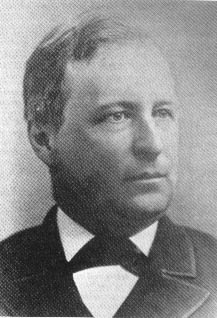Franklin Benjamin Gowen | |
|---|---|
 | |
| Born | Franklin B. Gowen February 9, 1836 Philadelphia, Pennsylvania, U.S. |
| Died | December 13, 1889 (aged 53) Washington, D.C., U.S. |
| Resting place | Ivy Hill Cemetery, Philadelphia, Pennsylvania, U.S. |
| Occupation(s) | Businessman, industrialist, monopolist, prosecutor, district attorney |
Franklin Benjamin Gowen (February 9, 1836 – December 13, 1889) served as president of the Philadelphia and Reading Railroad, commonly referred to as the Reading Railroad, in the 1870s and 1880s. He is identified with the undercover infiltration and subsequent court prosecutions of Molly Maguires, mine workers, saloonkeepers and low-level local political figures who were tried for multiple acts of violence, including murder and attempted murder of coal mine operators, foremen, workers, and peace officers.[1]
Other aspects of Gowen's presidency include:
- Despite the Reading Railroad being legally prohibited by its corporate charter from owning or operating coal mines, under Gowen's leadership the railroad obtained 142 square miles (368 km2) of coal lands and illegally ran numerous mining operations upon them,[2] but the state of Pennsylvania deemed the prohibition to be unenforceable.
- He was a central figure in negotiating both the first written labor agreement between mine workers and operators in the U.S., and the first industry-wide price-fixing agreement in the U.S. [citation needed]
- He played a signal role in the Great Railroad Strike of 1877, including the Reading Railroad Massacre.[3]
- Under his leadership the Reading Railroad twice fell into bankruptcy.[4] In the wake of the second one, Gowen was finally blocked from further direct involvement in the railroad's affairs when a syndicate led by J.P. Morgan obtained control of the corporation. [citation needed]
- ^ Report of the Committee of the Judiciary, General, of the Senate of Pennsylvania, in Relation to the Anthracite Coal Difficulties, with the Accompanying Testimony, Harrisburg, 1871; pp 14–15, 19, 33
- ^ Daggett (1908), p. 77.
- ^ Humphrey, Douglas L., "Reading's Place in The Great Strike & After", The Historical Review of Berks County, Fall 2000 (also available online Archived 2007-08-04 at the Wayback Machine).
- ^ For a detailed case study, see Daggett, Chapter III